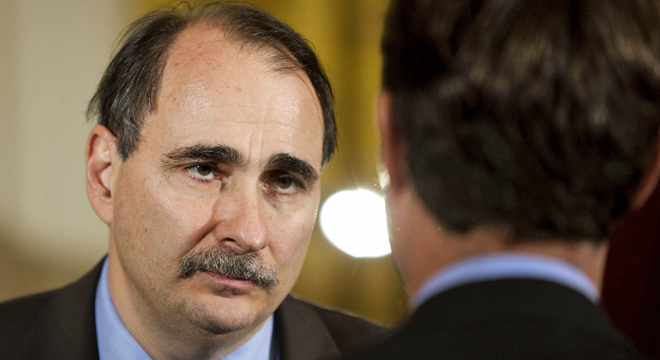Reflecting on Tuesday’s big victory, David Axelrod said the president’s success should force Republicans to reconsider whether they can succeed with their current makeup.
In the campaign’s final conference call with reporters, Axelrod said that the GOP had “soul searcing to do as to whether they’re going to represent the United States of America as the United States of America is and not based on some 50-year-old model.”
The president’s re-election team credited Obama’s success in turning out young voters, Latinos, African Americans, and women with swinging the election in their favor and providing a strong base of support as the focus now shifts towards governing again.
“The president got 70 percent of the vote among Latinos, he got 55 percent of the vote among women,” Axelrod said. “That reflects both his record and also the approach of the Republican Party, which has been to paint itself way out of the mainstream.”
Campaign officials said — while important — changing demographics weren’t the only plank in Obama’s winning strategy. His record on the auto bailout proved critical in building early leads in “firewall” states like Ohio, Wisconsin, and Michigan that never went away.
“We saw the whole industrial midwest as a bulwark for us,” Axelrod said.
Jim Messina, Obama’s campaign manager, credited the early decision to play up Obama as a compassionate man of the people against Romney’s colder and wealthier persona as another key part of their strategy.
“Twenty one percent of voters said that the most important thing was that the candidate cares most about people like me,” he said referring to exit polls. “Among those voters, Obama won 81-18 — which is a historic number.”
Messina nonetheless praised Romney’s campaign staff as “hard working Americans who wanted to make this country better” and said that they were “honorable” in their dealings.
Top strategist David Plouffe said Obama also performed well in the “moderate suburban counties that determine presidential elections,” citing his positions on education, tax fairness, and social issues as he core of his appeal.
As for what happens to Obama For America’s huge grassroots operation now that the president’s campaign days are over, that’s an open question. Messina said that the plan was to hold a “conversation with our supporters” as to the next step, but that the president believed very strongly in mobilizing his base to help support his policies.
Plouffe pointed to an Obama interview with Univision in September in which he said “you can’t change Washington from the inside — you can only change it from the outside” as a good encapsulation of the idea. While Romney seized on it at the time as a misstep, Plouffe called it a “defining moment” in the campaign that reflected the president’s deeply held belief that grassroots pressure is needed to force elected officials into action.






